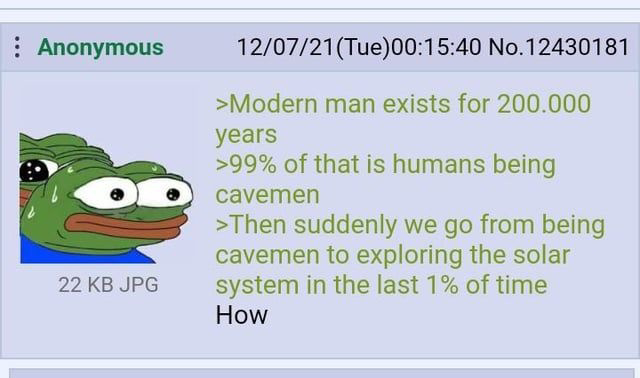this post was submitted on 05 Jan 2024
537 points (98.2% liked)
Greentext
6704 readers
1082 users here now
This is a place to share greentexts and witness the confounding life of Anon. If you're new to the Greentext community, think of it as a sort of zoo with Anon as the main attraction.
Be warned:
- Anon is often crazy.
- Anon is often depressed.
- Anon frequently shares thoughts that are immature, offensive, or incomprehensible.
If you find yourself getting angry (or god forbid, agreeing) with something Anon has said, you might be doing it wrong.
founded 2 years ago
MODERATORS
you are viewing a single comment's thread
view the rest of the comments
view the rest of the comments

Aaaaagriculture
And balls of steel
But really it's agriculture that enables us to have time and space to create things like society and technology. A society with rule of law and intellectual property allows for a lucky few to spend most of their time understanding how to make nature work for us, leading to industrialization and the crazy growth we're able to experience in a human lifetime.
I would say we are still in the very beginning stages of planetary exploration. Once someone is making a profit in space without military or scientific money, the fun will really begin.
Laziness.
"Alright fellas, time to start walking to the next camp. They dont call us nomads for nothing."
Paleolithic me: "Alright hear me out. What if, and I know this is gonna sound crazy, what if we just stay here. Forever?"
Switching to agriculture was the opposite of lazy. It was much harder work for a poorer standard of living. The issue was population pressure simply did not allow the old way of life anymore.
I think it was more about food stability.
I think laziness probably played a role, at least early on. There was an experiment in the 1960s (using a very loose definition of that word in the modern sense) which looked at harvesting grain in the Fertile Crescent using stone age tools. They found you could get about 1 kg of usable grain an hour that way, which would produce a slight surplus of calories for a year for a single person in about 200 hours (the number I saw was 3 weeks, but I did some back of the napkin math to check it). Barring the complications of figuring out how to actually store that much grain all at once, and actually learning to cultivating it intentionally, it seems like it might have been preferable to foraging constantly for some folks. Plus, it probably would have proven to be a more stable food source once people figured out storage, so lean months would have been a bit easier.
It was shortsighted laziness, though, because farming is definitely hard work, and likely no one expected it to become such a huge time sink.
https://belleten.gov.tr/tam-metin/1322/eng (Sorry for the slightly weird source; I couldn't find the original paper not behind a paywall, but it seems like a not-terrible journal)